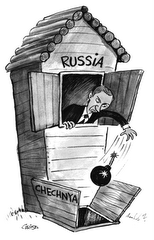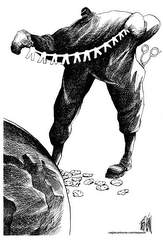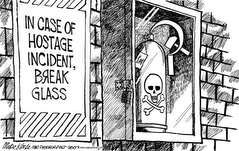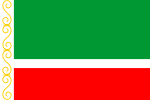"A War of Words over Russian". By Erika Niedowski. 12 May 2007. Baltimore Sun.
Erika Niedowski reports that conflict has occured regarding the official language of the former Soviet Union country Estonia. The majority of Estonians speak Russian, yet Estonian the official state language. Schools are pushed to teach in Estonian, although most teachers and students are not proficient in the language. Knowledge of Estonian is required in some governement jobs as well. Many ethnic Russians in Estonia beleive the current policy is discriminatory and unfair. Other former Soviet Union countries are facing similar issues as well. The author writes that the language of the people is an important aspect of their culture.
Genocide : the deliberate and systematic destruction of a racial, political, or cultural group (Merriam-Webster Dictionary)
Monday, May 21, 2007
Monday, May 14, 2007
News Summary
“Racism in Russia Overshadows WWII Remembrance” Vladivostok News. 4 May 2007. By Georgia J. Michlig.
Georgia Michlig reports on the dark shadow cast on the festivities commemorating Russian victory in World War II. While Russians celebrate the victory of the Nazis, Neo-Nazis and other extremists groups continue to attack minorities. Michlig reports that a local university urged students to stay indoors the week of April 20 to deter attacks. However, this did not stop extremists from assaulting a minority student. The article discusses numerous attacks on minority students; Asia, Muslim, and African; in recent months. Minorities interviewed expressed little hope of assimilating in Russia.
Georgia Michlig reports on the dark shadow cast on the festivities commemorating Russian victory in World War II. While Russians celebrate the victory of the Nazis, Neo-Nazis and other extremists groups continue to attack minorities. Michlig reports that a local university urged students to stay indoors the week of April 20 to deter attacks. However, this did not stop extremists from assaulting a minority student. The article discusses numerous attacks on minority students; Asia, Muslim, and African; in recent months. Minorities interviewed expressed little hope of assimilating in Russia.
The Genocide of the Circassian People
Genocide, one of the dominating issues of today’s international community, has unfortunately been an all too often occurrence throughout the history of Russia. Many of these genocides are not well known, or even known about at all, but few have catapulted into international fame, such as the incident in Chechnya. In fact, different sources can hardly agree on the definition of genocide, let alone whether or not it occurred in a given area. This makes the topic of genocide in Russia one not only of great importance, but also one which needs to be explored. In this essay I will explore the who, where, and why of a lesser known genocide in Russia, the genocide of the Circassian people.
The first topic which must be discussed when looking at a possible genocide is who is involved in the killing, and even more importantly, who is being killed. In this case it was the Circassian’s, a group of people numbering around 1.5 million, divided into ten tribes, and united under a democratic sentiment. Compared to their neighbors the Circassians were especially liberal, giving many more rights to their women, and allowing all religions to be worshiped freely. Much like the more recent incident in Chechnya, the Circassians attempted to declare independence from the whole of Russia, and just as the Chechens did, the Circassians found that mother Russia was not willing to let them go.
After fighting for more than forty years in international courts over their independence, the Circassians saw no end to their fight for independence and took the next step by declaring their independence in the courts of Europe. “But now we hear to our deepest humiliation, that our land counts as a part of the Russian empire on all maps published in Europe... that Russia, finally, declares in the West, that Circassians are their slaves, horrible bandits...” said a representative of the Circassians people in their historic attempt to remove the yolk of their overbearing motherland. A little more than two years after their appearance in the European courts, the Circassians finally instituted a unified government in Sochi, and acting in the only way they know how the Russians “began the final invasion, annihilation and expulsion” of the Circassian people. Now in Russia, there are only just over 200,000 Circassian’s, meaning over 1.3 million people, over 87% of the Circassian population, were either killed or deported during the onslaught. The events that transpired were most certainly wrong, and unsupported by the feeble excuses the Russian government offered their people, who cited “imperial ambitions” and “strategic interests” as their reasons for the slaughter.
Just like with any possible genocide, it is impossible to fully grasp the true scale and meaning of the issue, but when dealing with genocide’s that have been forgotten, all we can hope to do is remember those who died. Russia’s people have suffered through a history filled with genocide, and mass murder, at the hands of ruthless autocrats. It is this history that we must remember, to prevent atrocities like the Circassian genocide from happening again.
For more information of this topic visit-
http://www.unpo.org/article.php?id=1639
www.circassianworld.com/circassiangenocide.html
www.cc.jyu.fi/~aphamala/pe/issue2/circass.htm
The first topic which must be discussed when looking at a possible genocide is who is involved in the killing, and even more importantly, who is being killed. In this case it was the Circassian’s, a group of people numbering around 1.5 million, divided into ten tribes, and united under a democratic sentiment. Compared to their neighbors the Circassians were especially liberal, giving many more rights to their women, and allowing all religions to be worshiped freely. Much like the more recent incident in Chechnya, the Circassians attempted to declare independence from the whole of Russia, and just as the Chechens did, the Circassians found that mother Russia was not willing to let them go.
After fighting for more than forty years in international courts over their independence, the Circassians saw no end to their fight for independence and took the next step by declaring their independence in the courts of Europe. “But now we hear to our deepest humiliation, that our land counts as a part of the Russian empire on all maps published in Europe... that Russia, finally, declares in the West, that Circassians are their slaves, horrible bandits...” said a representative of the Circassians people in their historic attempt to remove the yolk of their overbearing motherland. A little more than two years after their appearance in the European courts, the Circassians finally instituted a unified government in Sochi, and acting in the only way they know how the Russians “began the final invasion, annihilation and expulsion” of the Circassian people. Now in Russia, there are only just over 200,000 Circassian’s, meaning over 1.3 million people, over 87% of the Circassian population, were either killed or deported during the onslaught. The events that transpired were most certainly wrong, and unsupported by the feeble excuses the Russian government offered their people, who cited “imperial ambitions” and “strategic interests” as their reasons for the slaughter.
Just like with any possible genocide, it is impossible to fully grasp the true scale and meaning of the issue, but when dealing with genocide’s that have been forgotten, all we can hope to do is remember those who died. Russia’s people have suffered through a history filled with genocide, and mass murder, at the hands of ruthless autocrats. It is this history that we must remember, to prevent atrocities like the Circassian genocide from happening again.
For more information of this topic visit-
http://www.unpo.org/article.php?id=1639
www.circassianworld.com/circassiangenocide.html
www.cc.jyu.fi/~aphamala/pe/issue2/circass.htm
Subscribe to:
Comments (Atom)




